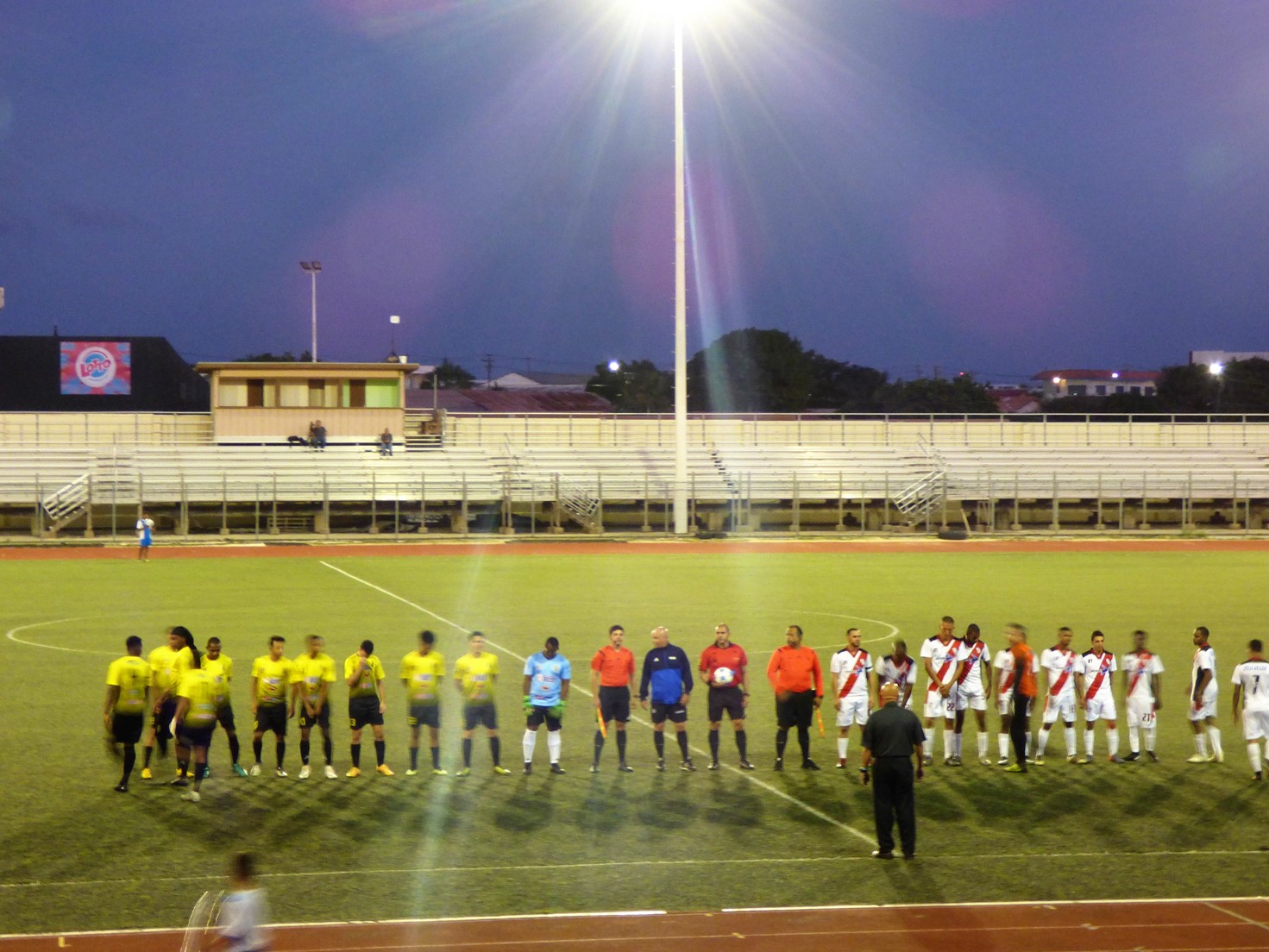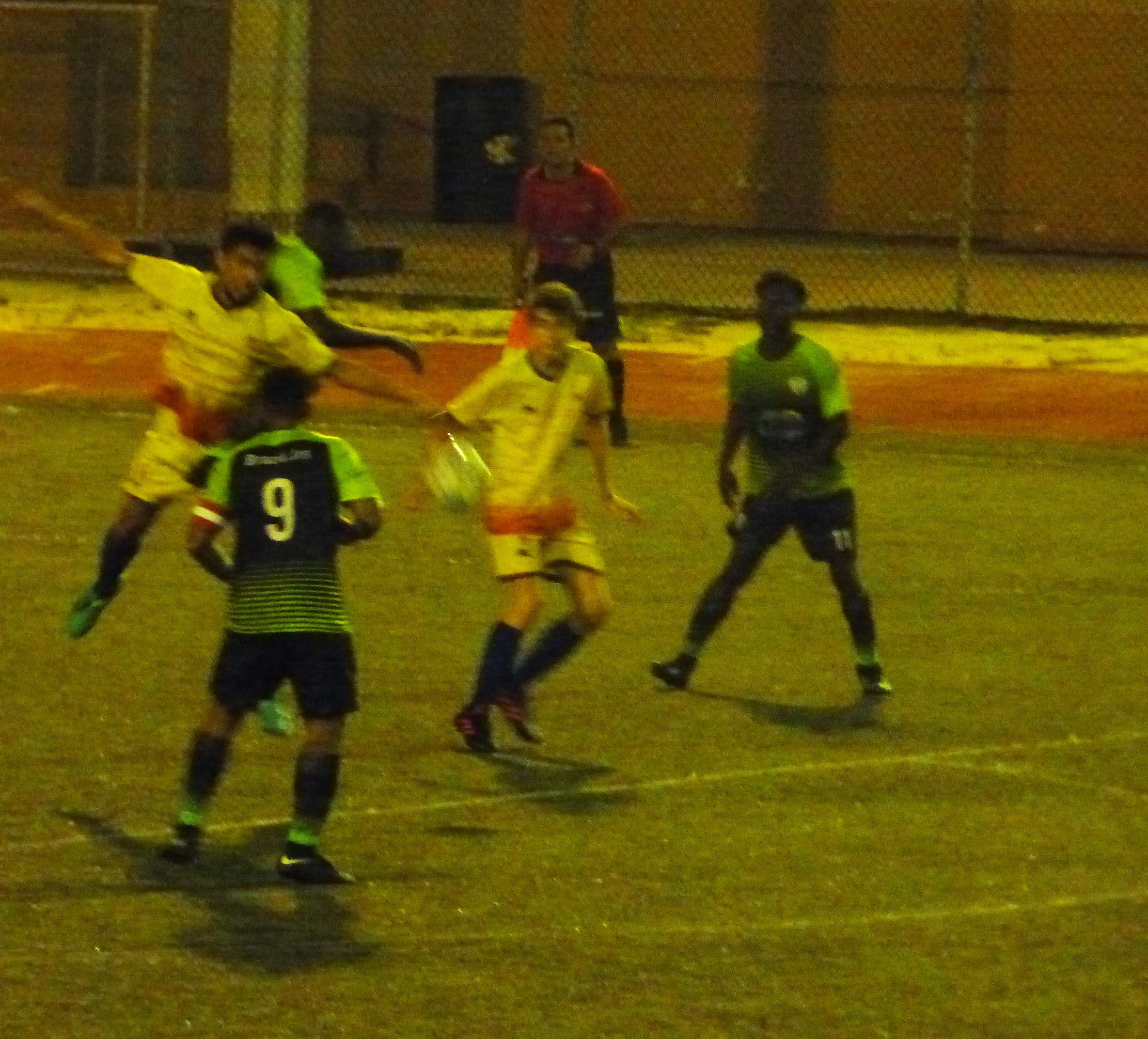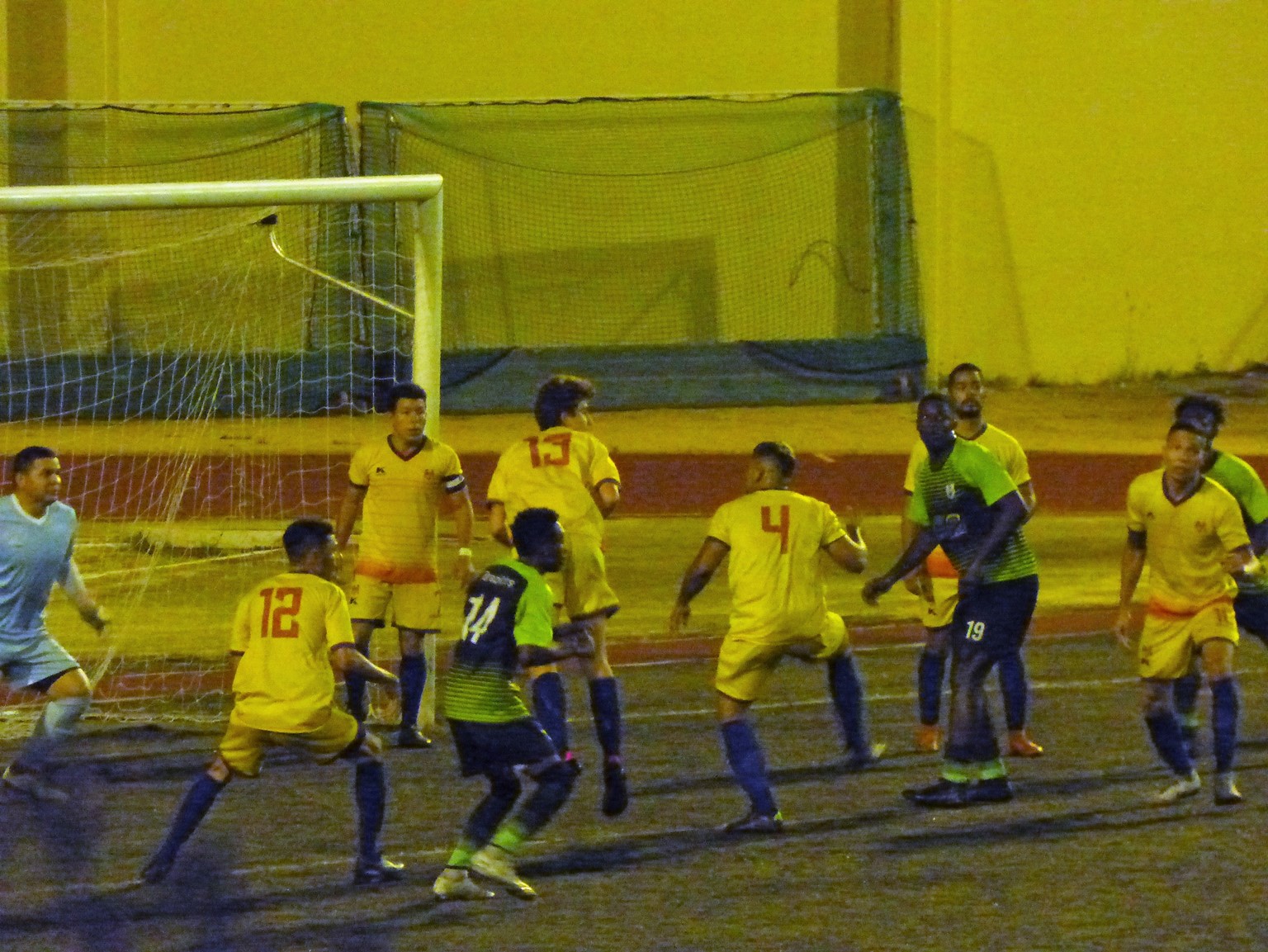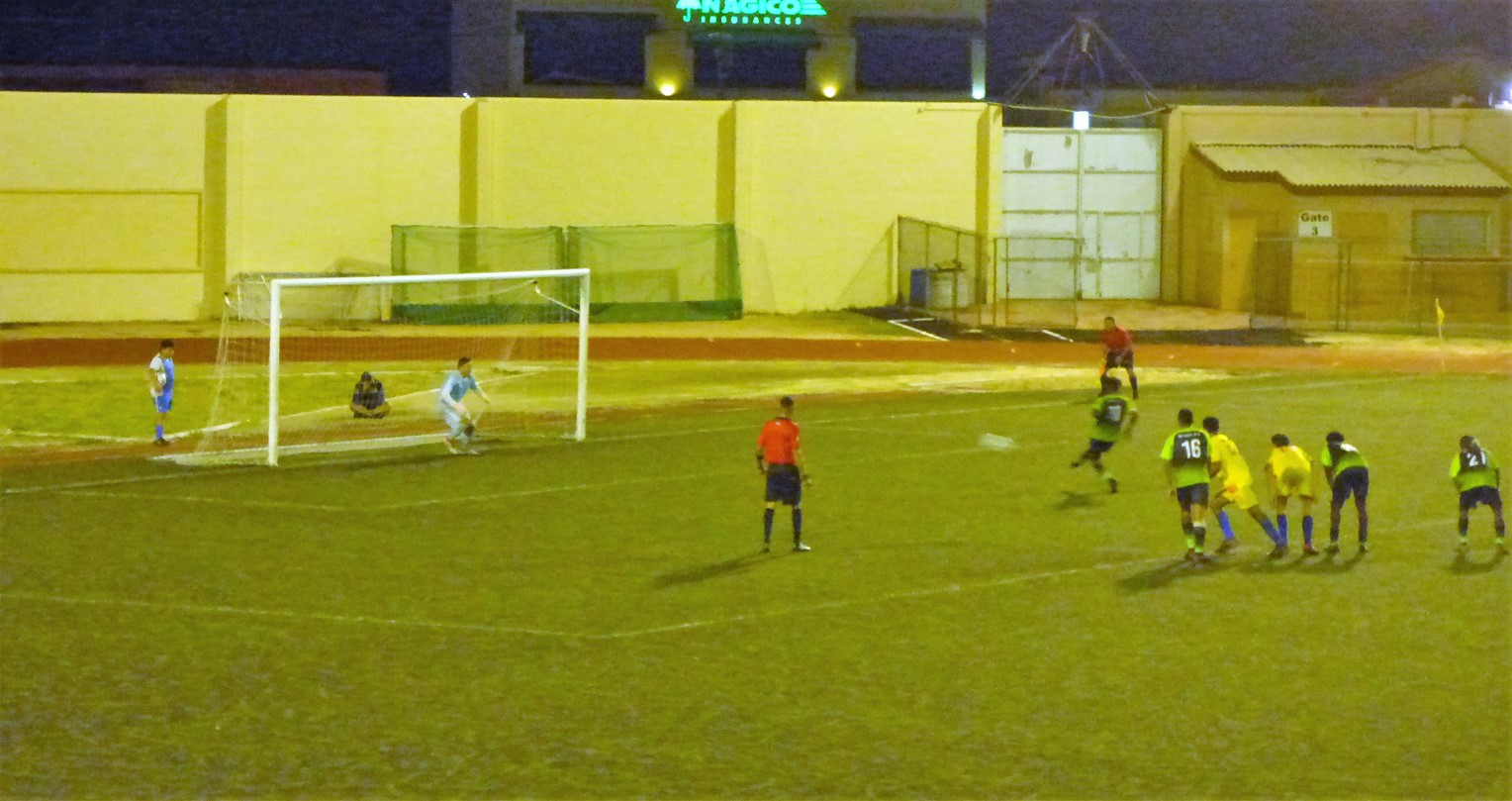Caribbean 6 – The ABC Islands (A is for Aruba)
At the end of my trip to Bonaire, I was getting worried about the flights for the rest of the ABC islands segment. Insel Air as I was told had a very poor reliability record. I tried to contact them without success, but when going back to my reservation, I saw that my Sunday flight time had been changed. Without anyone informing me. Not by a few minutes, but by eight hours. This would mean, quite simply that instead of being able to watch two games on Sunday in Curacao, I would arrive midway through the second match.
On arriving at the airport, I found desk of Insel Air.
Is this correct? Yes!
What has happened to the morning flight. We cancelled it!
Were you intending to tell me? No reply.
The flight will not suit me, I want you to change me to another airline! We won’t do that for you.
They agreed to an unspecified amount of refund, which I may receive via the travel agent that booked it – sometime next year; but it was down to me to book the earlier flight with another airline. Now I normally search for routes with the search sites, Skyscanner and Kayak – and I wanted to get the flight sorted quickly so I ended up paying £98 for a flight 45 minutes earlier than the cancelled one.
By comparison, the Insel Air flight to Aruba worked well. There was a note on the booking about a short amount of time to change planes, as one had to fly from Bonaire to Curacao and then onto Aruba. But as both flights were listed as being on a Fokker F-50, and the airline had only one such plane, one knew the connection would not be missed. I think the airline may in fact have only the one serviceable plane. I saw two larger aircraft in their livery at Curacao airport on this journey, (Thursday). They were still in the same place when I got back (Sunday), and again when I left (Tuesday). Websites such as flight radar 24 only show the Fokker as operating and even sometimes taking on the two hour each way trip to Sint Maarten. That flight should be with one of the larger planes, and seems to be cancelled frequently – making me glad that at least this was not the airline that had brought me to Curacao in the first place.
With the same plane running both legs of the journey, and luggage booked through, passengers making the connection stayed on the flight. Curiously I had two boarding cards with different seat allocations and had to switch while the plane was stopped – even though my original seat was not used for the second part of the journey.
While waiting for the flight in Bonaire, I ran into Ludwig Balentin again. His friend from the night before was now living in Curacao, and had only made a short visit. Apparently his first to the island in 30 years, most of the time spent working in the Netherlands, although he been in England as the company in the Netherlands had a contract during the building of the new Wembley Stadium.
On arrival, it was a taxi to transfer to the hotel. The taxis from the airport run at fixed price, US$21 for the journey which took about ten minutes. A lot of the accommodation on this trip has been in apartments, as in many of the destinations, the only hotels are either high end with the equivalent rates, or absolute dives with no facilities. By comparison, most of the apartments were quite good and the people running them were friendly and helpful. Prices were the equivalent or higher to the type of mid-range hotel I would normally us in Europe or Asia. In Aruba, I was in a modern and fresh hotel. I believe it had not been open long. The reservation site showed an artist’s impression of the outside, while in a couple of places, including within my room, there were electrical cables hanging from the ceiling waiting for some unknown extra to be fitted. It had most mod cons, and the real advantage of an upstairs communal lounge and veranda with a coffee maker running through day. Surprisingly, it lacked running hot water. The apartments I had stayed already in Curacao and Boaire also lacked this, but I would have thought a modern hotel would have thought to add this. The hotel is at one end of the road known as Caya G. F. Betico Croes. This is far too complicated name, especially in an area which has many visitors just jumping off the cruise ships. Hence a secondary name has been added, Main Street. Betico Croes was a leading politician in Aruba in developing the territory’s route to independence in the 1970s.
Main Street itself is wonderful. It is pedestrianised, except for a tramway that runs straight down the middle, and they play a curious mixture of Spanish pop and English Christmas pop and carols over speakers. I am fairly sure the pop music I heard was Spanish, but throughout the ABC Islands, a lot of what I took to be spoken Spanish was actually Papiamento. This is a local creole language with its routes in Spanish and Portuguese. The people in these islands are very polyglot, and the majority speak Papiamento, Spanish, Dutch and English. Although Dutch is the official language of the islands, it is the least used of the four. I rode the tram from the terminal by my hotel down to the end and stayed on back to my start point. It took about an hour. At other times, I walked the route which takes ten minutes each way. The tram is free and runs on batteries, so no unsightly overhead cables. A variety of shops and restaurants are situated on it, and the local bus terminal is at the bottom end. The really high-end shops, casinos and restaurants are closer to the cruise terminal.
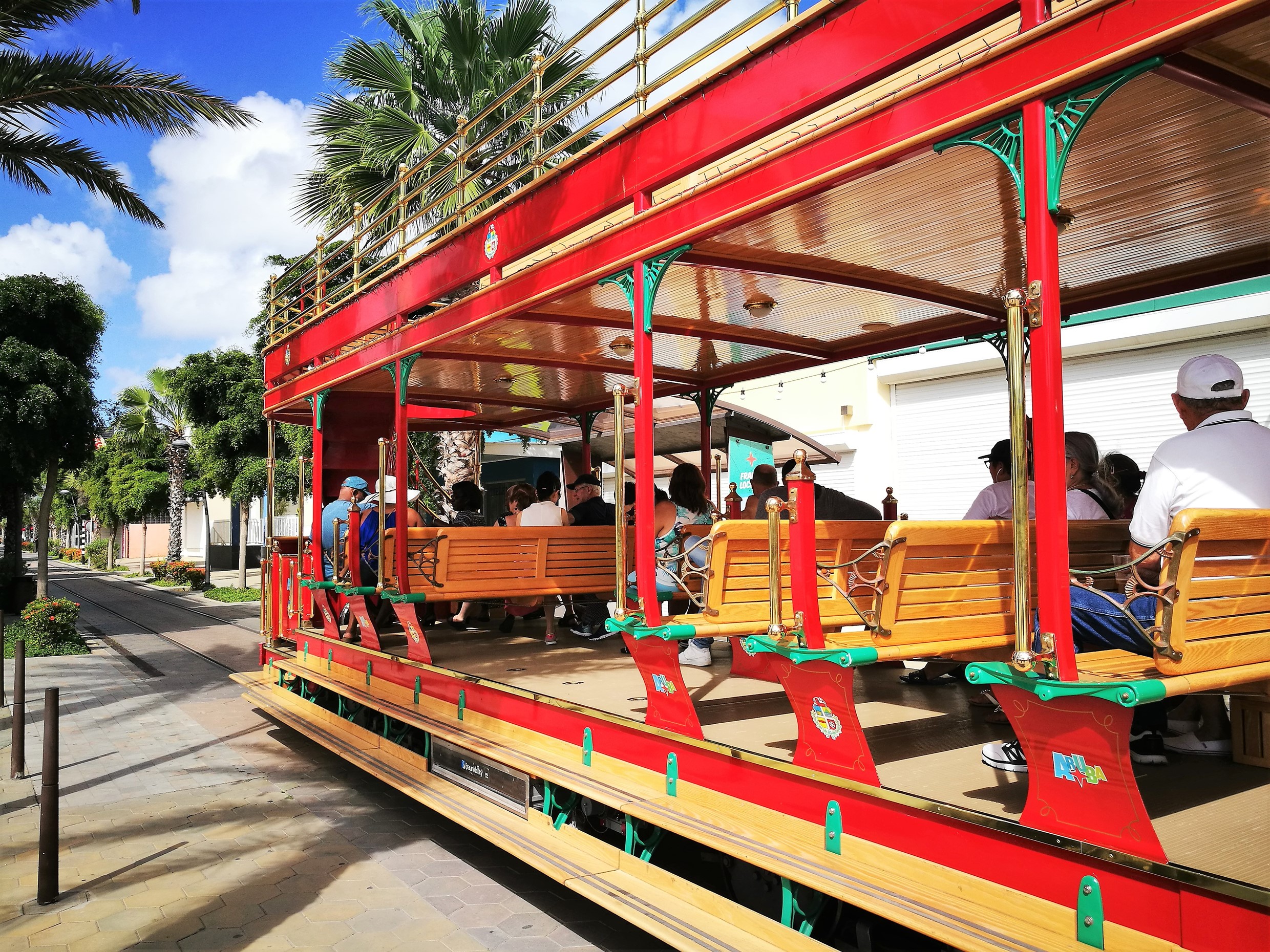
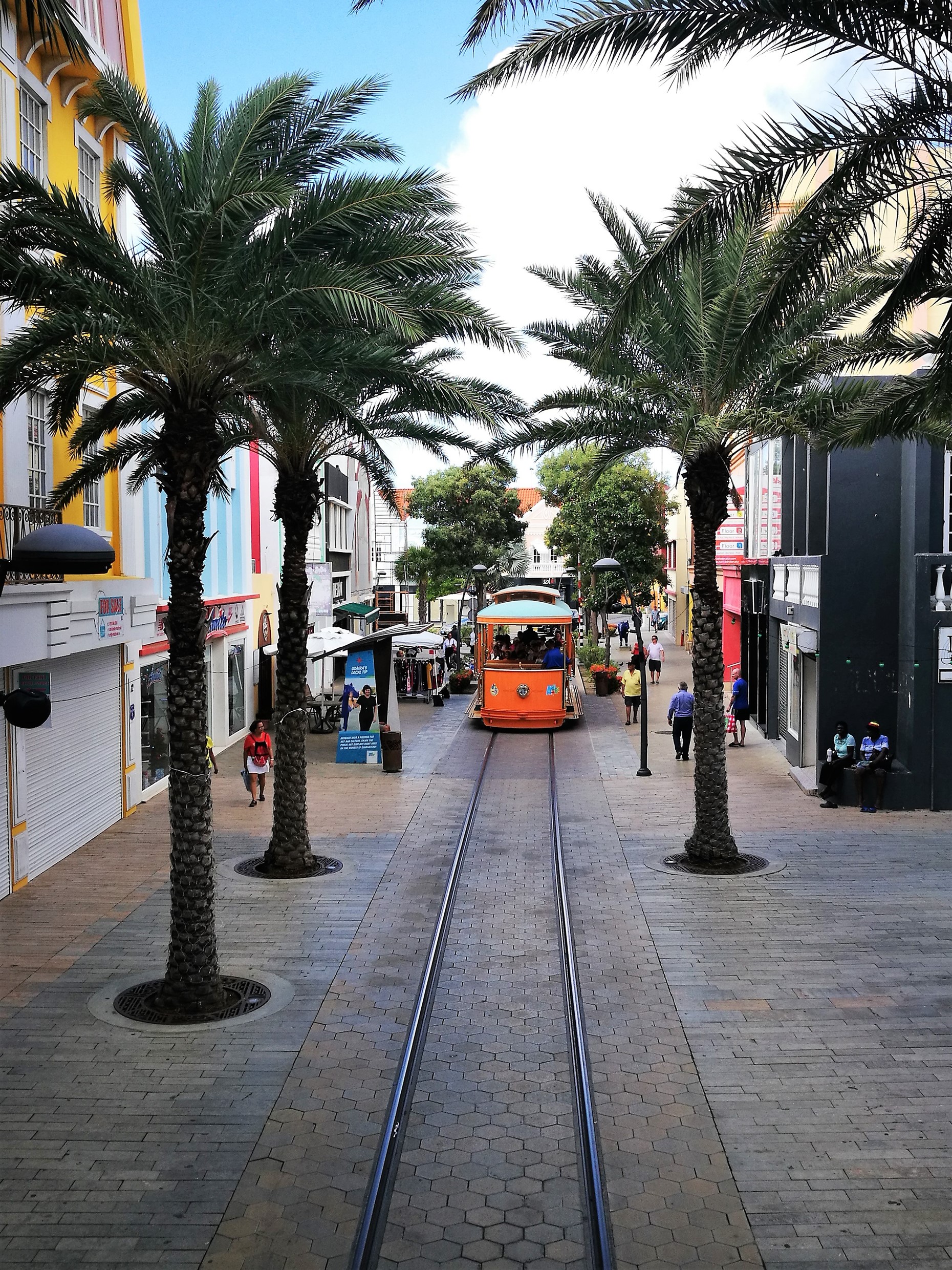
The island has a second tourist area, for those that want to stay there. The top end of this is called the high-rise hotel zone. Slightly further south is the low-rise hotel zone. I got to the high-rise zone and it was also sanitised for tourists. Guide books however do recommend using the buses to travel between town and hotel, as a cheap alternative to taxis. As I have mentioned in the other reports, the idea of a taxi as a transport that can be used by the average citizen has not caught on in the Caribbean. If a local can afford taxi fares, then s/he can also afford to buy a car. Every island I have been on suffers from traffic jams.
Aruba had come under Dutch control in 1636 and remained as such until the 1970s. At the time, the Netherlands included seven territories that are considered Caribbean. This includes Suriname, which like Guyana and French Guyana is on the South American mainland. Only Suriname has actually become fully independent. Aruba official changed its status to being a constituent country of the Netherlands in 1986. This separated it from the rest of the Netherlands Antilles and allowed its own Football Association to become a full member of FIFA, which occurred in 1988.
At the time, Aruba was supposedly on the road to full independence, but this was suspended (at Aruba’s request) in 1990.
I wanted to get out to the offices of the Aruba Voetbal Bond, and managed this without difficulty. The trip involved catching the number 7 bus from the main bus station and asking to be dropped off at the right point. I easily managed to confirm my fixture plan while there. The top division games are played in the main stadium, a conveniently short walk from my hotel, while the lower division is split between the main stadium and the Centro Deportivo Frans Figaroa. I spoke briefly too with the national team coach, Martin Koopman and arranged to meet him again the next day at the top division games. The office was within the Centro Deportivo Frans Figaroa, but there is not a lot there and it was four hours to kick off. My plan was to get down to the high-rise hotel area and find the Fireson Brewery, the island’s only craft outlet.
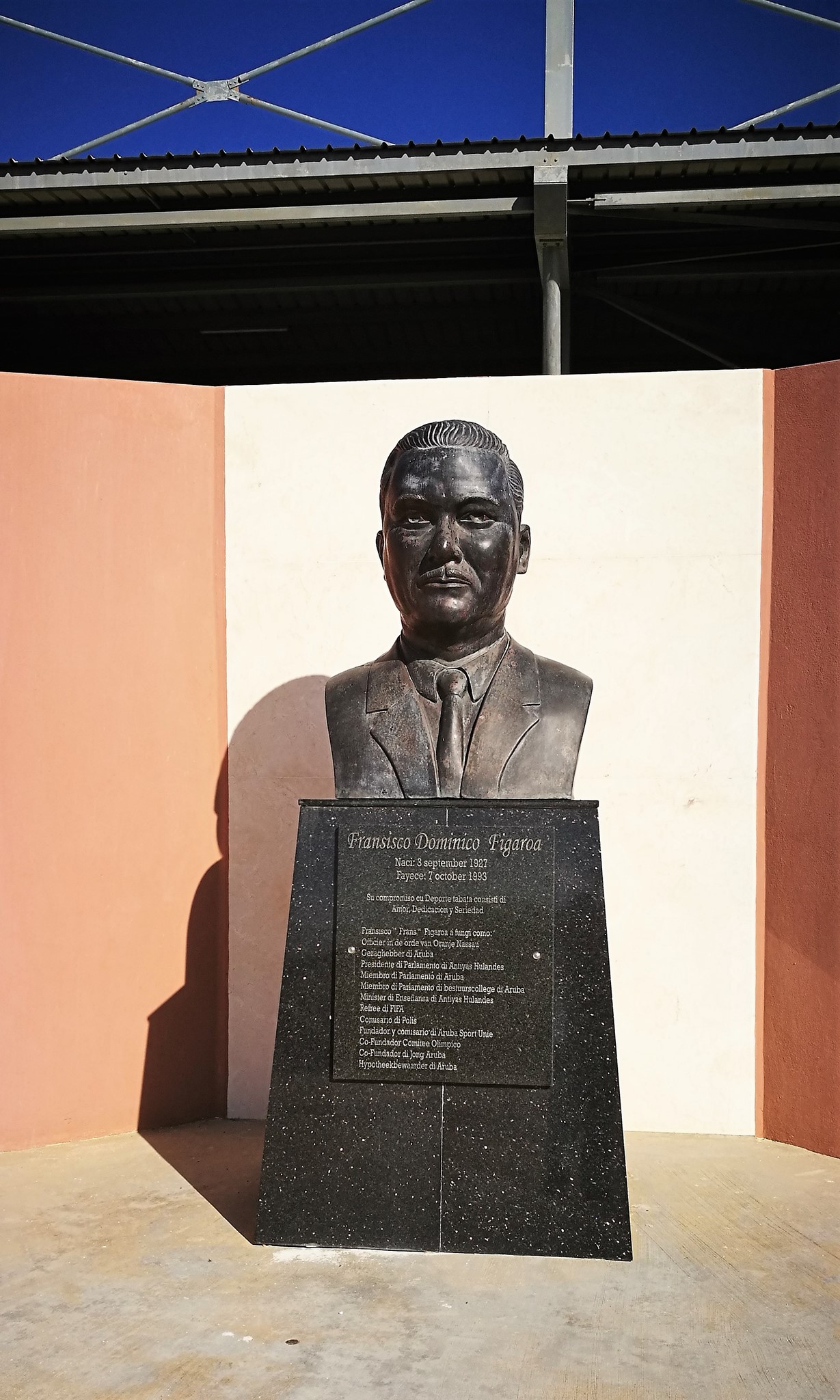
This plan was not difficult in itself, but I managed to fail to be in the right place to stop the service bus as it passed, or a couple of the small minibuses that also supply transport. In the end, I completed the full journey from the stadium on foot, taking about 45 minutes. Much of this was along major roads, but there is always some type of footway, mainly of gravel or small stones. The general appearance of the buildings around was good. As I approached the hotel area, everything gradually became more up-market.
Even with the walk, I arrived at my destination just ten minutes after the scheduled opening time and found the building apparently deserted. After a scout around, someone did let me in and told me they were not opening for another 10-15 minutes. I asked if I could wait inside, and could I have a beer while I waited. No problems. That had three beers on tap, a very hoppy unfiltered IPA and two stouts. I tried all three. The only food on offer was Pastechi, the local variant on a pasty. I had a couple of these as well.
Considering that the main bus schedule is published, but only for departure times from Oranjestad, I managed to work things out well, leaving the bar just before seven and knowing I did not want to walk back as it was now getting dark. The first bus along was indeed my route, (this is a once and hour service, while the other route to Oranjestad runs every ten minutes). It would of course have helped if the route number or intermediate points were displayed on the front of the bus, rather than just the final destination, but at least the driver was helpful. He even told me, as I left the bus that the last run on the route would leave Oranjestad at 9.30, meaning that it would get to the stadium on its return soon after 10, ideal for an 8 o’clock kick off.
There is no admission charge, and I have some time to relax before trying to find the team lists. When I drop down to find them, I discover that there is a problem. Not with the teams who are all present and correct, but with the officials. There is a loan, eighteen-year-old official in the dressing rooms. This is Leandre Trimon and he is scheduled as one of the assistant referees. His colleagues for the game are no where to be seen. Trimon tells me that he had taken sole charge of an U-20 game in midweek and it had not gone well, so he was unwilling to take on the task alone. There are a number of urgent phone calls going on and just after the official kick off time, I am told we have secured a replacement referee and we just have to wait for him to get there.
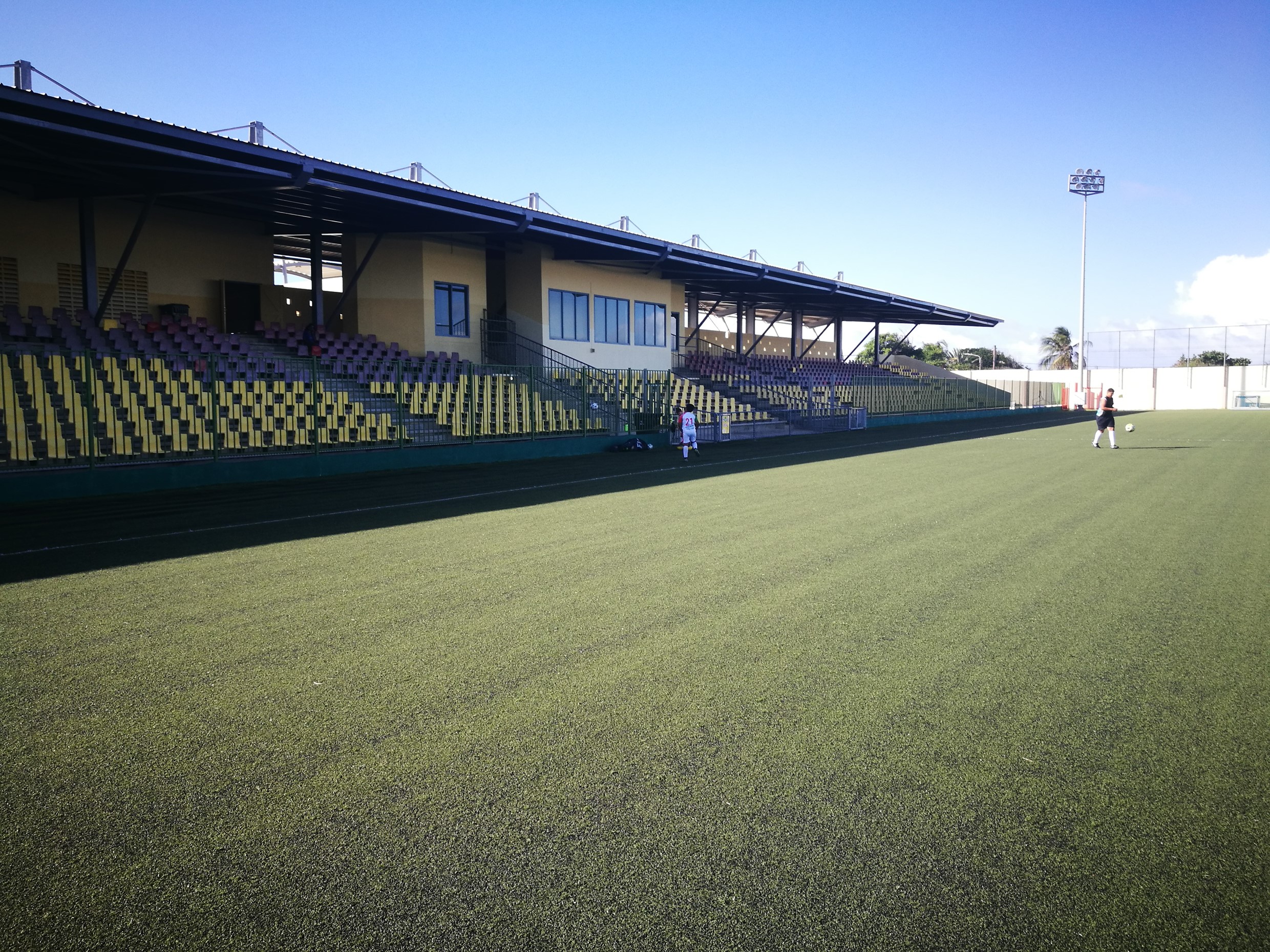
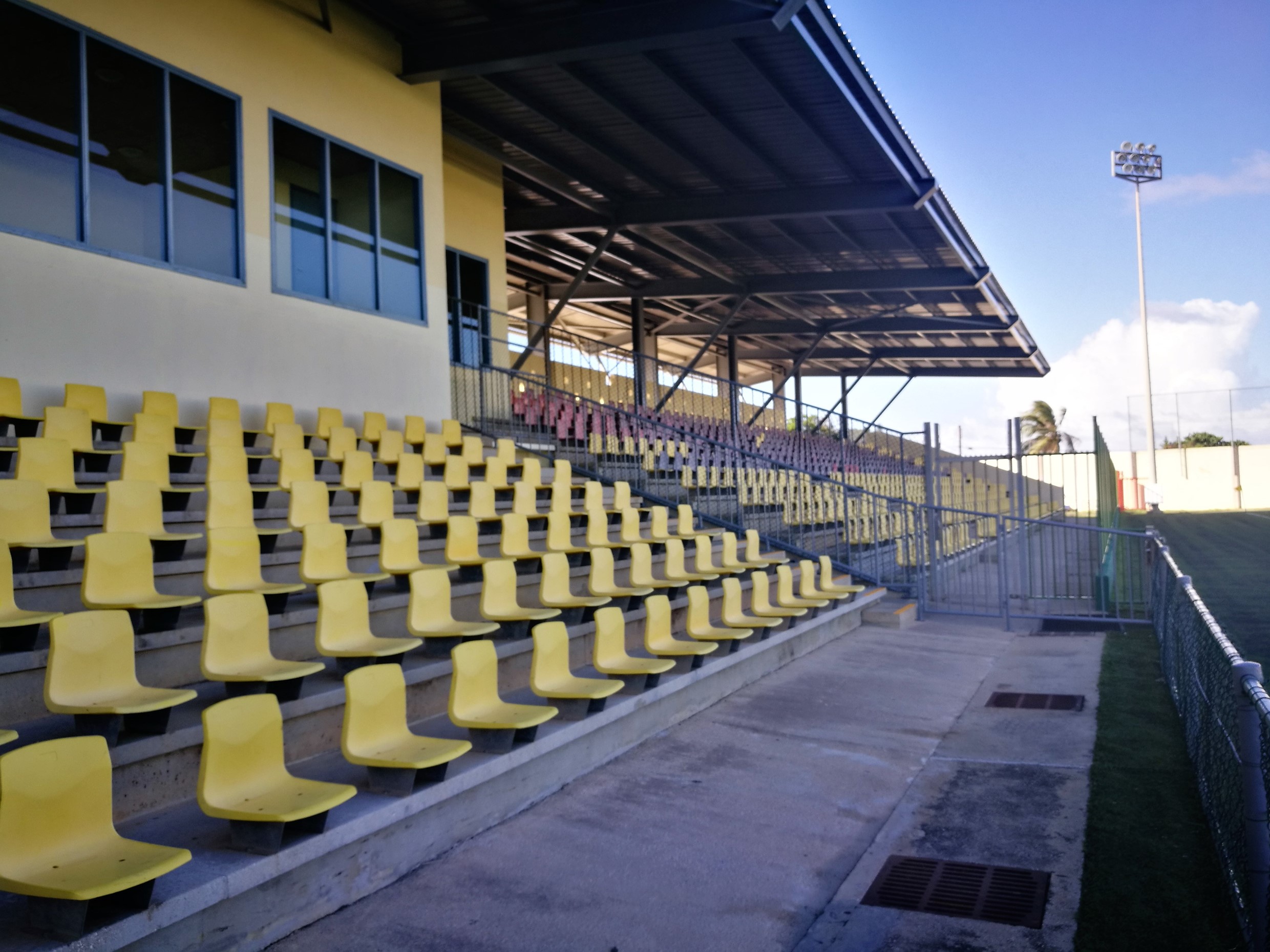
Leandre has been refereeing for two years, and has been to an age group CONCACAF tournament on Curacao. When he got there, all the referees were told they had to be presentable. This apparently means no beards, and certainly no dreadlocks. I am thinking that such discrimination would not be allowed in Europe. My friend shaved off his small beard for the next day. Local referees who did not suffered extra fitness training. Apart from that, he was most concerned with the problem the late kick off would have on his social life. He had a girlfriend to meet later in the evening! He still was happy to agree to help me get away from the stadium when I said I needed help because the delay meant the game would not finish until after the last bus.
Our referee turned up, having driven from the main stadium and we kicked off 40 minutes late. Apparently, the replacement, Mr. W. Tromp (I misheard and asked, “as in President”. Certainly not, its with an ‘o’).
The stadium is one sided, with the single tier stand having plenty of plastic seats for all. The access pathway is at the top, and there are no refreshment facilities inside the ground. Instead, I went out to the supermarket across the road to stock up at half time. I was not alone in this, and made it back to my seat in good time.
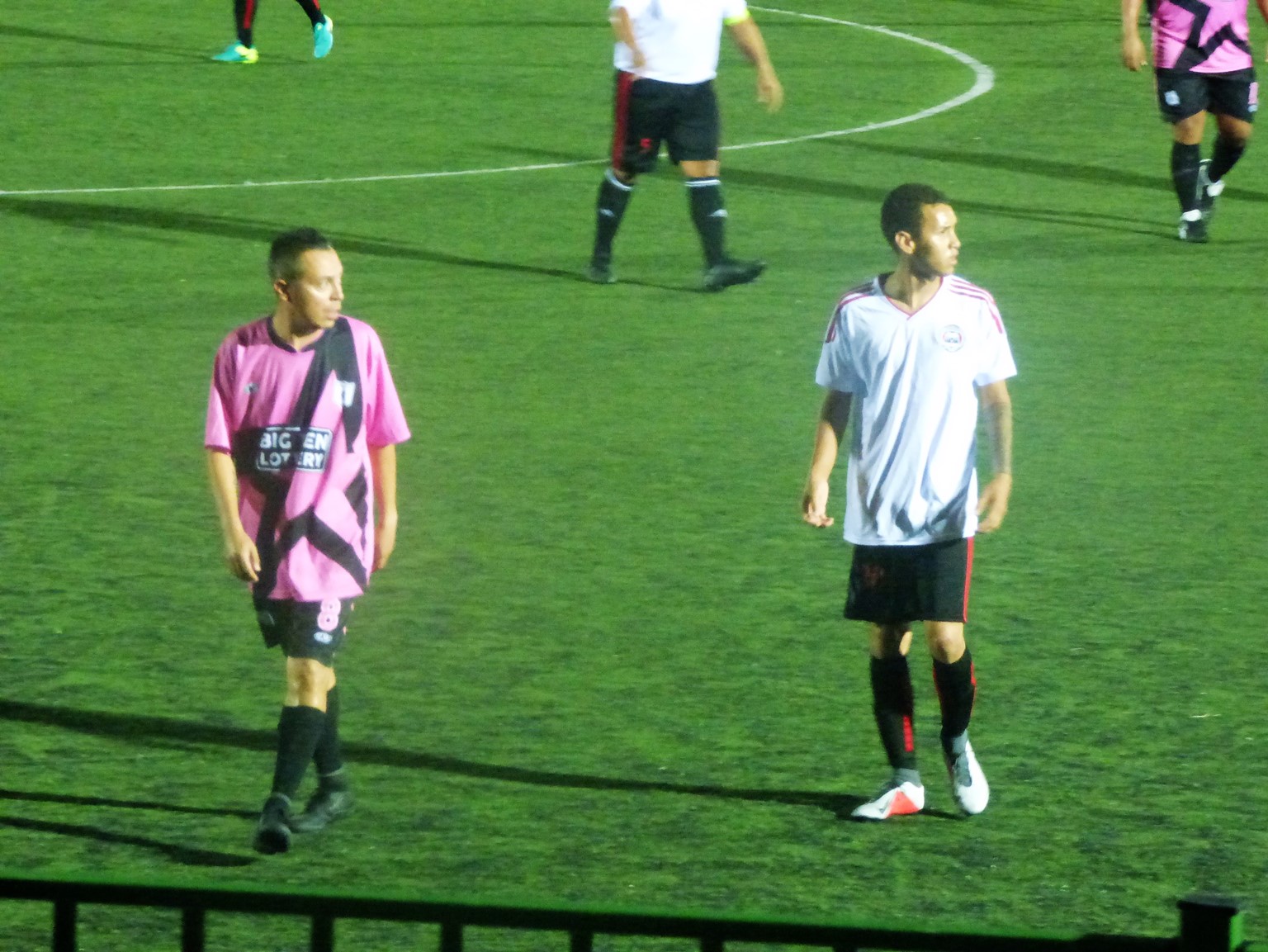
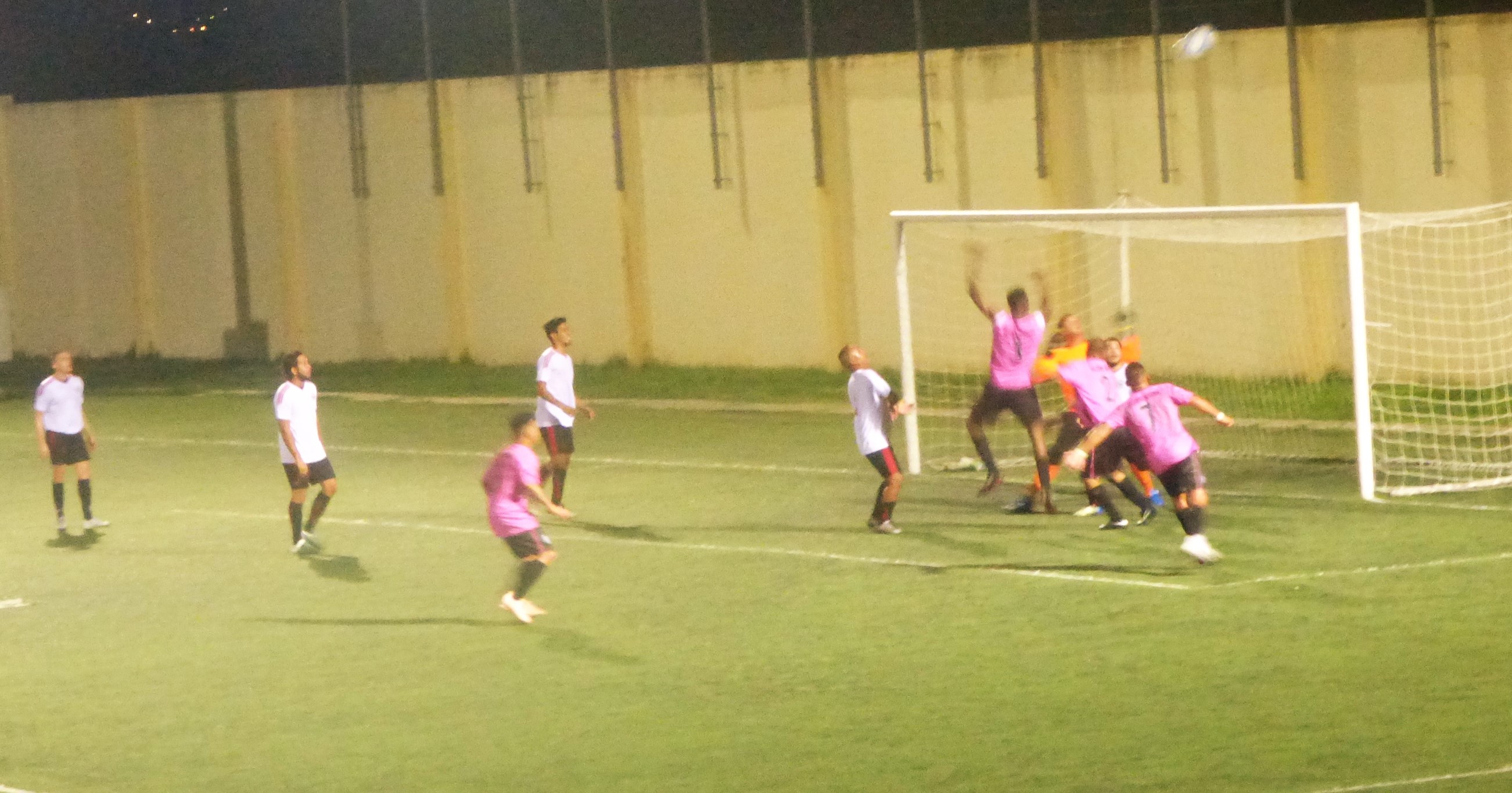
My match was between Jong Aruba and Real Koyari. The Jong Aruba side had a splendid pink kit, with a partial outline of a five-pointed star shown in black. Real played in a more straightforward combination of white shirts, black shorts. I had been warned by Leandre Trimon that Division Uno, as it is called is a bit like English Sunday league football. In fact, it was quite a mixed ability game. With only two levels of open football in Aruba, all the better players are in Division Honor, and this division includes players who are hoping to get there, players who still want to play past their prime and some who just never made it. Some were very fit, others were almost as slow as this writer. The one thing that was clear was that Jong Aruba, even though not all their players were Jong, were easily the better team and with two goals in each half, they ran out as easy winners. Real Koyari scored once in the second period giving us a final score of 4-1
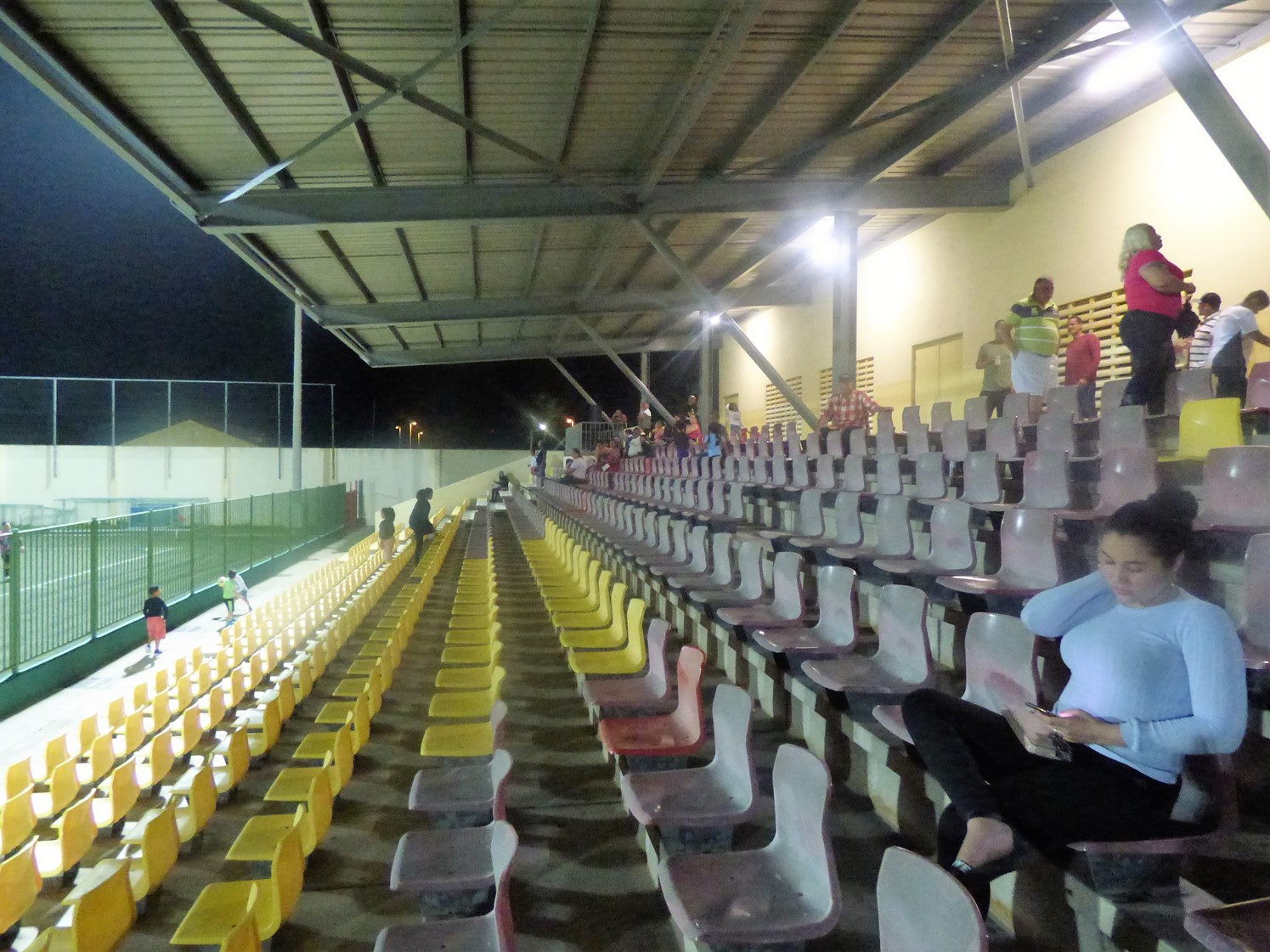
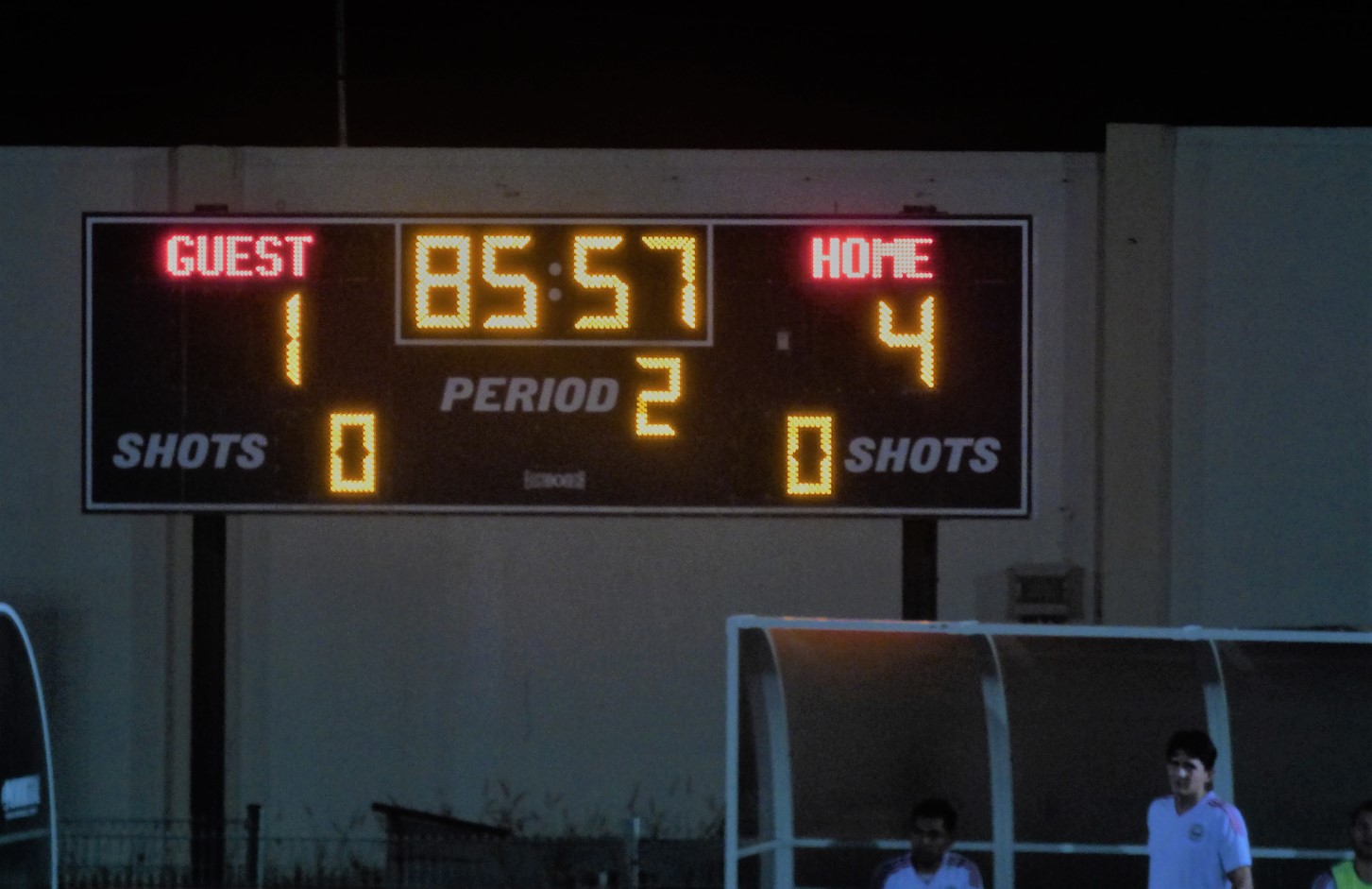
I waited outside the dressing rooms while the referee and assistant were tidying up. It seems there is quite a bit of paper work after the game, and the packs of player passports have to be returned to the team coaches. Leandre Trimon quite liked the idea when I mentioned it that in France, Belgium and Germany this is all done on tablets, and that the French FA have provided the tablets so as they are available in Martinique and Guadeloupe. He found it strange to hear that we are lagging behind such technique in England.
After the game, he did not shower at the ground, (although when questioned, he said facilities were there). Instead his parents picked us up outside, drove to his house where he quickly showed and changed and then into town where they dropped me off before taking him on to meet his girlfriend outside the cinema. Hope it was a good film.
On the Saturday, I meandered around the town without doing anything much, wrote up some of my blog on Bonaire and in the early evening made the walk to the Guillermo Prospero Trinidad Stadion. This means that on a trip where I only managed to pass through Trinidad to change flights, I saw football at two grounds named after people called Trinidad.
This stadium is two sided, and with a running track. There are no spectator facilities provided behind the goals. The far side was a single metal stand, with rows of metal seats sitting on scaffolding, while opposite is the older covered stand, in two sections with a large gap in the middle for entry and exit from the ground. There are small number of central seats with the press box behind above this central gap, and thanks to having arranged to meet with Martin Koopman, this is where my (complimentary) position in the ground was. The seating area each side of the centre is on wooden benches. The stand itself is concrete, post war but quite old, while the roof which does not extend over the full area appears newer.
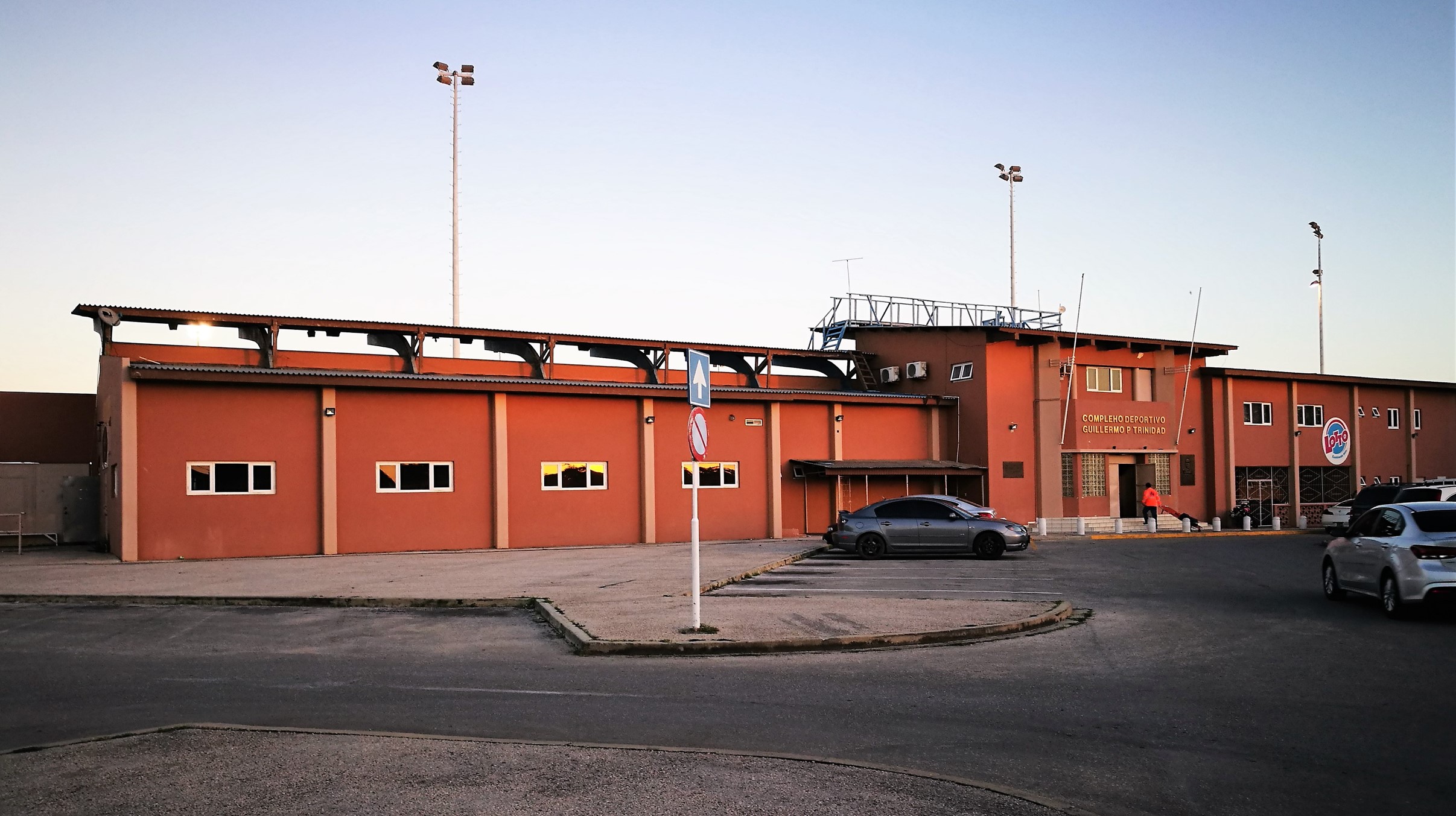
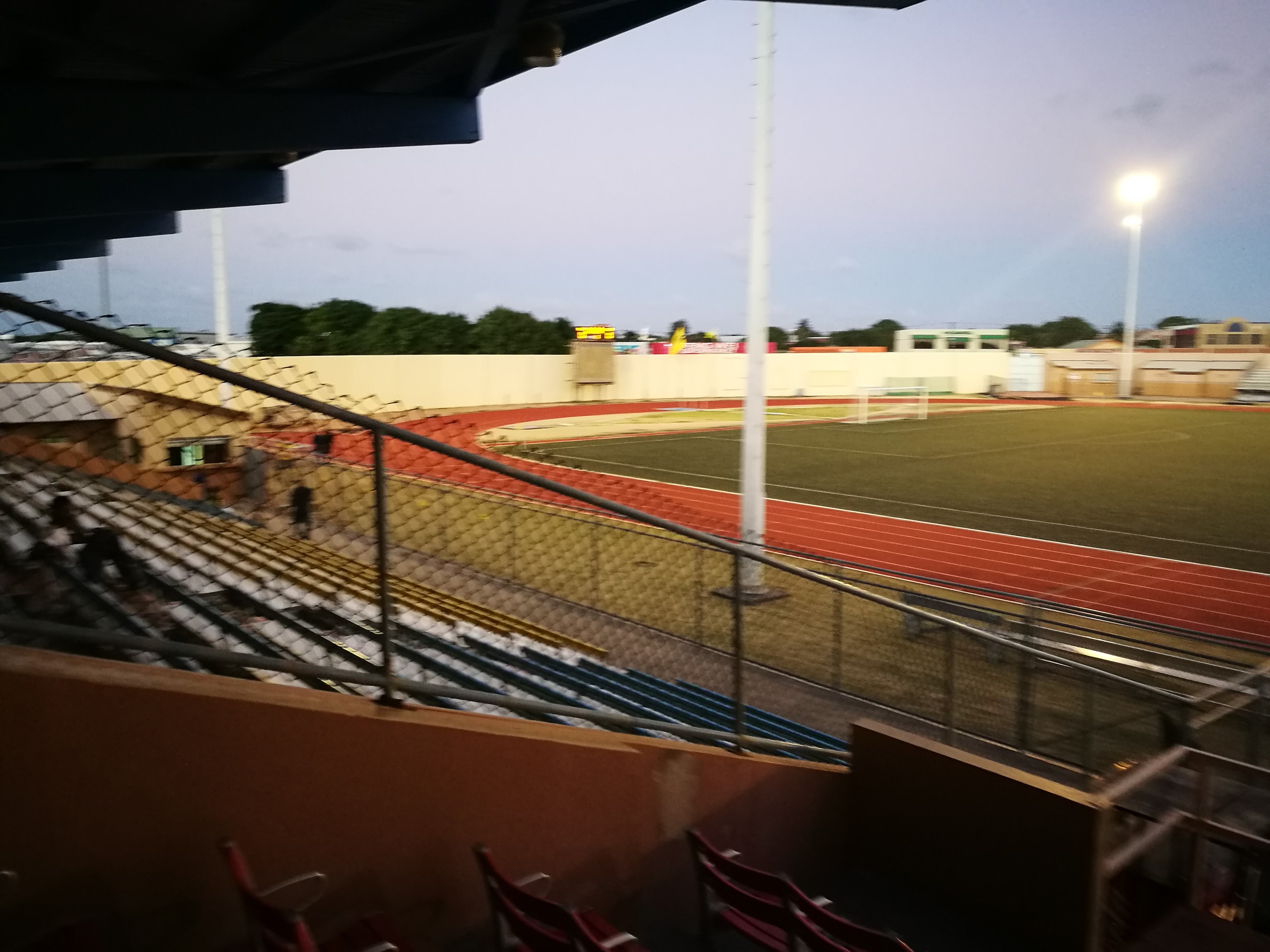
There are two games to watch, 6.30 and 8.30 kick offs. The first sees league champions Dakota playing against River Plate, while this is to be followed by Brazil Juniors against Britannia. Some of the names, such as Dakota refer to areas of the island, (the stadium itself is in the Dakota district), but most appear to be chosen because they sound good. Most clubs are based around one or other of the island’s villages. The name Brazil Juniors, I was told was after the Brazil Nut tree rather than the country. The story was that there is a large Brazil Nut tree in the village. Since Aruba is an arid country, while the Brazil Nut tree normally grows in the rain forests of Brazil and Bolivia, I would need confirmation that this was not a tall tale.

The league is arranged in a division of ten teams, with five matches every weekend at this single stadium. The top four then go into a play-off, playing another six matches each. As more people watch these, there were no double headers (at least last season). This would increase the income. There is then a final over two legs – with a third match if these go one each way. There is, at least no penalty shoot-out in games one and two, so Dakota won last season’s title after the first game finished goal-less and the second was won 4-2. Deportivo Nacional, were the beaten finalists having finished one point ahead of Dakota in the group of four, but three points behind them in the original ten team league. That means the two teams met eight times in the course of the season. At least they avoided clashing in the Cup.
This season, Dakota had lost for the first time a week before I arrived, which meant that Nacional went to the top of the table by winning the Friday game. Dakota therefore needed to win in order to take back the lead (on goal difference). This was not aided by an early goal against, but over the first 70 minutes, their attacking 3-4-3 formation gave them an edge and they deservedly had turned the game around to lead 2-1. At this point, one of the midfielders was sent off for spitting at an opponent. Dakota responded by going into a shell, and dropping back to a 4-4-1 formation after substitutions. There were no shortage of substitutions here. Division Honor teams are allowed four, and Dakota did not hold back. They had changed two at half time, in response to being a goal down, and two more after the card. In the division uno game the night before, five changes were allowed and a total of nine substitutions were made in the game.
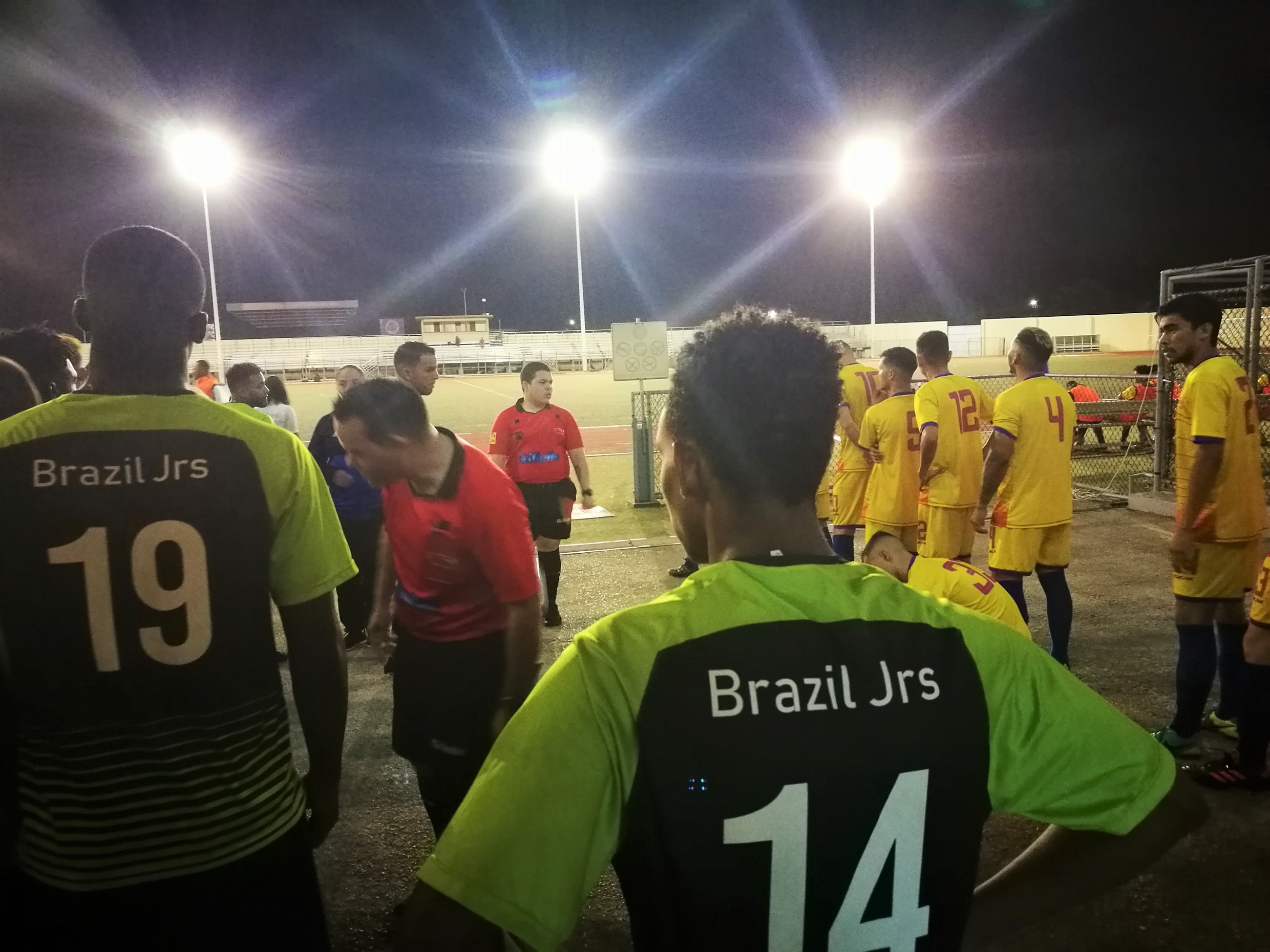
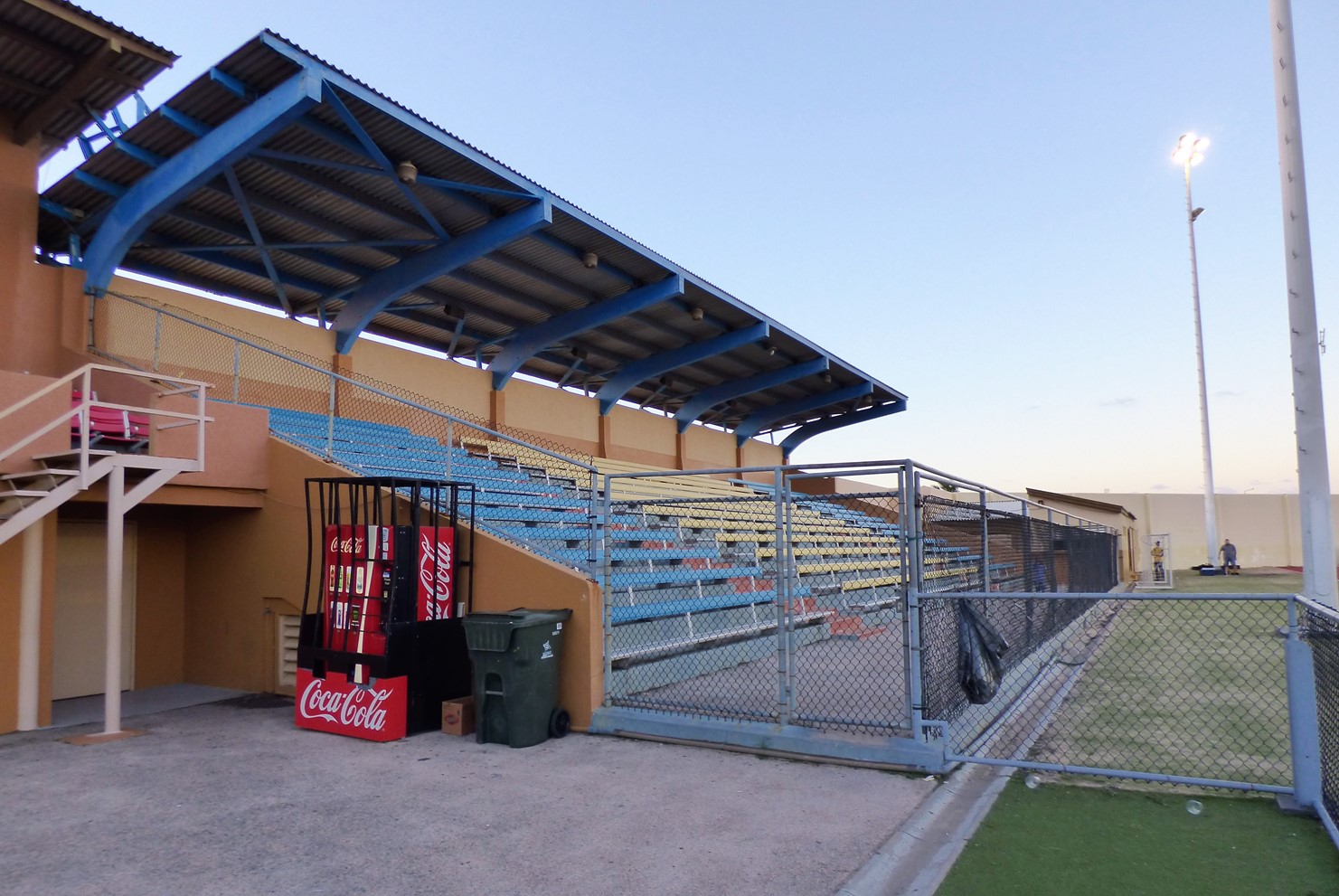
The lock-down worked and the game finished at 2-1 to Dakota who remained top of the league.
Brazil Juniors were to win the second game. They were promoted from the lower division last season and the talk was that they were doing much better than expected to keep themselves in the top half of the league. I was promised by some that they would have an exciting flourish to them, but in retrospect this was not the case. The game was slightly dour, especially when compared to the earlier entertainment. Britannia, who started (and finished) the weekend in third place were also uninspired. A goal midway through the first half put Brazil ahead and Britannia lost a man (second yellow card) midway through the second. After that, you could not see them getting back into the game. Still it took a penalty a minute before the end to give the Juniors a more comfortable scoreline.
